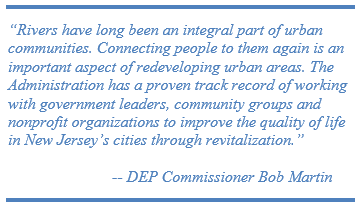Christie Administration Announces Groundbreaking for Nearly $8 Million Expansion of Newark’s Riverfront Park
PROJECT WILL FURTHER CONNECT RESIDENTS, DOWNTOWN WORKERS AND VISITORS TO RESURGENT PASSAIC RIVER
(16/P94) TRENTON – Department of Environmental Protection Commissioner Bob Martin joined with Newark Mayor Ras J. Baraka and The Trust for Public Land today to announce the groundbreaking for a nearly $8 million expansion of the city’s Riverfront Park, an urban greenway that is once again connecting city residents to its Passaic River waterfront.
 The announcement marks the beginning of the third phase of the park’s development, which entails two stretches of riverfront land that will be developed with a boardwalk, walkway system, a fitness zone, an overlook with seating, a bikeway, space for open-air events and a gateway to the downtown area. A walkway will also be constructed under the Jackson Street Bridge, allowing safe pedestrian crossing between the Ironbound section of Newark and downtown.
The announcement marks the beginning of the third phase of the park’s development, which entails two stretches of riverfront land that will be developed with a boardwalk, walkway system, a fitness zone, an overlook with seating, a bikeway, space for open-air events and a gateway to the downtown area. A walkway will also be constructed under the Jackson Street Bridge, allowing safe pedestrian crossing between the Ironbound section of Newark and downtown.
The DEP is providing approximately $6.3 million toward the estimated $7.76 million cost of this phase of the project, including funding for park construction and remediation. The Trust for Public Land has provided the balance of the funding through private donations and other local sources. Horizon Blue Cross/Blue Shield of New Jersey, based nearby, is funding the Horizon Wellness Trail through the Horizon Foundation and the Healthcare Foundation of New Jersey is providing funding for the Fitness Zone.
“The Christie Administration is proud to be a key partner in the development of Riverfront Park, which is helping to transform the Newark waterfront by reconnecting residents to the Passaic River through the creation of green space and recreational opportunities,” Commissioner Martin said. “Rivers have long been an integral part of urban communities. Connecting people to them again is an important aspect of redeveloping urban areas. The Administration has a proven track record of working with government leaders, community groups and nonprofit organizations to improve the quality of life in New Jersey’s cities through revitalization.”
 “Our continued work on Riverfront Park allows the Passaic River to serve as a front door to the city,” said Mayor Baraka. “Partnerships like the one we have here with The Trust for Public Land, Horizon Blue Cross/Blue Shield of New Jersey, the New Jersey Department of Environmental Protection and Essex County ensure that residents and visitors alike benefit from the city’s growth and prosperity. Riverfront Park shows what can be accomplished by working together.”
“Our continued work on Riverfront Park allows the Passaic River to serve as a front door to the city,” said Mayor Baraka. “Partnerships like the one we have here with The Trust for Public Land, Horizon Blue Cross/Blue Shield of New Jersey, the New Jersey Department of Environmental Protection and Essex County ensure that residents and visitors alike benefit from the city’s growth and prosperity. Riverfront Park shows what can be accomplished by working together.”
“In addition to providing a great outdoor space for city residents and downtown workers to enjoy Newark’s riverfront, our partnership is helping to create a healthier community,” said Trust for Public Land New Jersey Director Anthony Cucchi. “For example, the park’s expansion will soon provide a Fitness Zone to exercise in, a new dedicated lane for cyclists, and the Horizon Wellness Trail to connect Newark’s Ironbound neighborhood with downtown Newark.”
The first phase of the park system – developed as the result of a partnership among the city, Trust for Public Land and Essex County Parks Department – opened in 2012 and provides playing fields for baseball, soccer and football, as well as basketball and tennis courts.
A second phase of the park opened in 2013. This phase connected the recreational complex to the park through a gateway linked to riverfront green space, which was developed with a boardwalk noted for its burnished orange planking made from recycled plastic, walkways and a floating dock.
The Christie Administration has committed more than $12.5 million toward the development of the park network, including funding for development of the park’s various phases. The DEP’s Green Acres program, Office of Natural Resource Restoration – which funds ecological restoration projects through settlements with polluters – and Site Remediation Program provided funding and technical resources towards the park’s development.
Other key partners include the Healthcare Foundation of New Jersey, the Prudential Foundation, the Geraldine R. Dodge Foundation, Greenspaces – A Fund of the Community Foundation of New Jersey, the Richmond Savings Foundation and the Victoria Foundation, Newark’s Department of Housing and Urban Development and the U.S. Housing and Urban Development’s Community Block Grant Development Program.
The DEP added the park development sites to its Brownfield Development Area Program in 2009. Under this initiative, the DEP works closely with communities to design and implement plans that transform contaminated and/or underutilized properties into productive places again. The last use of the park development area was the Balbach Smelting and Refining Works.
The project is expected to be completed in about a year. The first phase of work will include and remediation of contaminants from historic fill – slightly contaminated dirt moved from other  parts of the city many decades ago to reclaim waterfront land – as well as a small area of contamination from polycyclic aromatic hydrocarbons and total petroleum hydrocarbons. These areas will be capped with clean fill, grass, trees and shrubs.
parts of the city many decades ago to reclaim waterfront land – as well as a small area of contamination from polycyclic aromatic hydrocarbons and total petroleum hydrocarbons. These areas will be capped with clean fill, grass, trees and shrubs.
The Christie Administration has played a pivotal role in another key component of revitalization – making sure the river is remediated from decades of industrial pollution that has contaminated sediments with pesticides, metals, PCBs and dioxins from the production of the Vietnam War-era defoliant Agent Orange.
In partnership with the DEP, the federal Environmental Protection Agency has launched a $1.4 billion remediation of the most heavily polluted stretch of river sediments, an 8.3-mile stretch of the lower river downstream of the park site. This project includes removing 3.5-million cubic yards of contaminated sediments to out-of-state facilities as well as bank-to-bank capping.
The EPA has removed the most heavily contaminated sediments from portions of the river near the Diamond Alkali Superfund site. The company polluted the river with toxic dioxins resulting from the manufacturing of Agent Orange.
The Passaic River was vital to the region’s economy for more than 100 years, attracting thousands of jobs and bringing prosperity, but pollution ultimately led to bans on any harvesting of crabs and limitations on eating fish from the river.
Today, due to many years of efforts – including cleaning up past contamination and park development such as the Riverfront Park project – Newark is realizing its potential as an important recreational and natural resource.
For more on the project from the Trust for Public Land, visit: www.tpl.org/our-work/parks-for-people/newark-riverfront-park
PHOTOS/Micro Documentaries for the Trust for Public Land